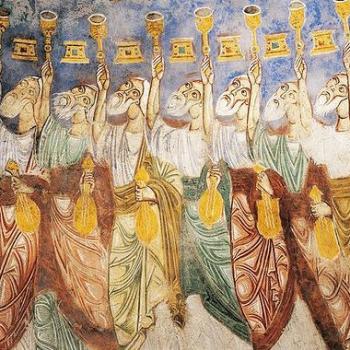One of my faithful visitors here pointed me to the following recent essay posted to the Desiring God blog by one Joe Rigney (professor at John Piper’s Bethlehem College and Seminary) entitled “Confronting the Problem(s) of Evil.” The link is: http://www.desiringgod.org/resource-library/articles/confronting-the-problem-s-of-evil.I am not sure whether Rigney is the author of the essay; the “voice” is Piper’s in many ways. It’s unsigned, but the “by” box at the top says “Joe Rigney.” So I will attribute it to him.
In the essay Rigney argues that God’s sovereignty is like that of a human author’s over his or her narrative. Human authors frequently write novels in which their characters do terrible things. Just as we don’t blame the human author for the acts committed by his or her characters, so we shouldn’t blame God for the acts committed by sinful people.
Of course, I think the analogy breaks down. If a human author somehow gained the magical ability to bring her characters to life so that they do actually commit horrific acts of murder (for example), we would hold the author responsible (as well as the now alive characters). The only reason we don’t hold authors responsible for murders committed by their characters in novels is because the characters and the murders are imaginary, not real.
But that’s not the point I want to press here. I’ve already talked with numerous Calvinists about that and other points related to God’s sovereignty and, for the most part, our conversations have ended in what I would consider impasses. That is, we can’t come to agreement about God’s moral responsibility for acts he foreordains and renders certain.
If I could talk to Rigney (or someone who agrees with him), here is what I would ask:
“You seem to believe that people who understand God’s sovereignty the way you do (as all-determining, comprehensive, meticulous) rightly feel not only shock but abhorrence at events such as school shootings in which multiple children are killed. But why? My question is not why you DO, but why you think it’s right to have such feelings. I”m not asking about moral rightness; I’m asking about logical rightness.
IF God foreordained and rendered certain a particular event for a greater good (as you assert), why, as a Christian, embrace feelings of abhorrence about them? Shouldn’t you at least TRY not to feel abhorrence about them? After all, they are actually good from a higher perspective–the one you claim to have that sees them as necessary events brought about by God for the greater good.
The “abhorrence” I’m talking about here is not the natural sensation of shock and dismay and sadness. I understand it may be impossible for anyone to avoid that in the face of murdered children. The abhorrence I’m talking about is the repugnance at the evil of such an event that most people also naturally feel.
If I had your perspective, I would strive to overcome that abhorrence in the face of any event. I would strive to be stoic about every event, realizing emotionally as I would intellectually that it is what God desires to happen and therefore must be, in the highest sense possible, good, however evil it may seem from a finite perspective.
Now I assume you will appeal to God’s alleged complex emotions in the face of evils he ordained and governs (to use Piper’s language). However, I assume that when God sees a terrible evil occur that he ordained and governs, he doesn’t feel moral repugnance about it. That would imply a split in God himself. The negative emotion God feels (from your perspective and John Piper’s) must be something like the horror we feel when we hear about child murders, but it surely can’t be moral repugnance insofar as he, God himself, wanted it to happen and rendered it certain according to his will for the ultimate good.
If you say that God DOES feel moral repugnance when creatures do evil, then I can only assume you radically reject the doctrine of divine simplicity and believe that God actually morally abhors that which he himself plans and renders certain for the greater good. In that case, it seems, God operates from a finite perspective like we most often do.
What I’m asking about is your feelings about your feelings about evil. Do you ever sit back and reflect on whether and to what extent your moral repugnance and righteous indignation in the face of radical evil are justified?
Now, please, understand my question rightly. Again, I’m NOT asking whether, as a mere mortal, a creature, feelings of moral repugnance in the face of radical evil are normal. I’m sure they are. What I’m asking is how you feel about them. Do you embrace them or seek to resist them? If you embrace them, why? Why not try to resist them? Surely it’s possible. We’re told that the stoics of the ancient world accomplished that–at least to some degree.
Perhaps you’ll say that such feelings are simply irresistible. But my question is whether you think they are right. What justifies them rationally? Even if they are irresistible, why not ALSO celebrate such horrific events since you know, however you feel, that they are ordained and rendered certain by God FOR THE GREATER GOOD?
Again, IF I held your perspective about God’s sovereignty I would do my best to push aside feelings of moral repugnance in the face of, for example, child murders, and view them stoically if not as causes for celebration. Why not?”















